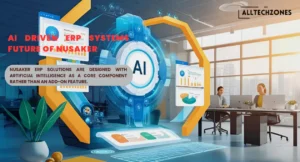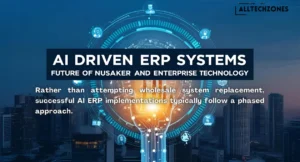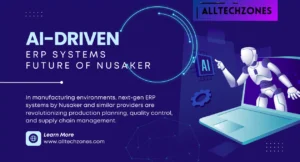Introduction
The landscape of enterprise resource planning (ERP) is undergoing a revolutionary transformation. As businesses worldwide seek more intelligent, automated, and efficient solutions, ai driven erp systems future of nusaker are emerging as the cornerstone of modern enterprise management. At the forefront of this technological evolution stands Nusaker, a company poised to redefine how organizations approach their operational workflows through artificial intelligence integration.
The convergence of AI and ERP technology represents more than just an upgrade—it’s a fundamental shift toward predictive, adaptive, and self-optimizing business systems. For organizations considering their digital transformation journey, understanding the implications of AI-powered ERP platforms like those being developed by Nusaker becomes crucial for maintaining competitive advantage in an increasingly automated world.
This comprehensive exploration examines how AI-driven enterprise resource planning is shaping the future, with particular focus on Nusaker’s innovative approach to smart ERP systems. We’ll delve into the benefits, implementation strategies, and transformative potential that artificial intelligence in ERP technology brings to modern businesses.
Understanding AI-Driven ERP Systems
What Makes ERP Systems AI-Driven?
Traditional ERP systems function as centralized databases that integrate various business processes across departments. However, AI ERP systems go significantly beyond basic data management. These next-generation platforms incorporate machine learning algorithms, natural language processing, predictive analytics, and automated decision-making capabilities that transform raw data into actionable business intelligence.
AI-powered ERP platforms analyze patterns in real-time, predict future trends, automate routine tasks, and provide intelligent recommendations. This evolution from reactive to proactive system management represents a fundamental paradigm shift in how businesses operate their core processes.
Core Components of Intelligent ERP Solutions
Modern AI-driven enterprise resource planning systems integrate several key technological components:
Machine Learning Algorithms: These systems continuously learn from historical data and user interactions, improving their accuracy and effectiveness over time. The algorithms identify patterns that human analysts might miss, enabling more informed decision-making across all business functions.
Predictive Analytics: By analyzing historical trends and current data streams, AI ERP systems can forecast demand, predict maintenance needs, anticipate supply chain disruptions, and optimize resource allocation before issues arise.
Natural Language Processing: This technology enables users to interact with ERP systems using conversational language, making complex data queries accessible to non-technical users and streamlining the user experience significantly.
Automated Workflow Management: AI systems can automatically trigger processes, approve routine transactions, and escalate exceptions based on predefined rules and learned patterns, reducing manual intervention and processing time.
Nusaker’s Vision for AI-Powered ERP
Pioneering Innovation in Enterprise Technology
Nusaker has positioned itself as a forward-thinking leader in the development of AI ERP software solutions. The company’s approach focuses on creating intelligent systems that not only manage business processes but actively contribute to strategic decision-making through advanced analytics and automation.
The Nusaker AI ERP innovations center on developing platforms that understand business context, adapt to changing conditions, and provide proactive recommendations. This approach differs from traditional ERP vendors who typically focus on feature addition rather than fundamental intelligence integration.
Nusaker ERP Solutions: A Comprehensive Approach

Nusaker ERP solutions are designed with artificial intelligence as a core component rather than an add-on feature. This foundational approach ensures that AI capabilities are deeply integrated into every aspect of the system, from financial management and supply chain optimization to human resources and customer relationship management.
The company’s development philosophy emphasizes creating smart ERP systems with AI that grow more valuable over time as they accumulate data and refine their algorithms. This evolutionary approach means that Nusaker ERP future trends will likely include increasingly sophisticated automation and predictive capabilities.
For more Tech related blogs keep visiting Alltechzones.
Benefits of AI in ERP Systems
Enhanced Decision-Making Capabilities
One of the most significant benefits of AI in ERP systems lies in their ability to transform decision-making processes. Traditional ERP systems provide historical reporting and basic analytics, but AI-powered platforms offer predictive insights that enable proactive rather than reactive management strategies.
These systems analyze vast amounts of data from multiple sources, identifying correlations and patterns that inform strategic decisions. For example, an AI-driven ERP might predict customer churn based on purchasing patterns, payment history, and interaction data, allowing businesses to implement retention strategies before customers actually leave.
Operational Efficiency and Automation
AI ERP system implementation brings substantial improvements in operational efficiency through intelligent automation. Routine tasks such as invoice processing, inventory management, and financial reconciliation can be handled automatically, freeing human resources for more strategic activities.
The automation extends beyond simple rule-based processes to include complex decision-making scenarios. AI systems can evaluate multiple variables simultaneously and make nuanced decisions that previously required human intervention, significantly reducing processing time and improving accuracy.
Cost Reduction and Resource Optimization
The impact of AI on ERP future includes substantial cost reductions through optimized resource utilization. AI algorithms continuously analyze operational data to identify inefficiencies, suggest process improvements, and automatically adjust system parameters for optimal performance.
These optimizations occur across multiple dimensions: reducing inventory carrying costs through better demand forecasting, minimizing energy consumption through intelligent scheduling, and optimizing staff allocation based on predicted workload patterns.
Improved User Experience and Accessibility
Modern AI-powered ERP platforms prioritize user experience through intuitive interfaces and intelligent assistance. Natural language processing capabilities allow users to query systems using everyday language, while machine learning algorithms personalize interfaces based on individual usage patterns and preferences.
This accessibility improvement is particularly valuable for organizations with diverse user bases, as it reduces training requirements and increases adoption rates across different skill levels and technical backgrounds.
For more Tech related blogs keep visiting Alltechzones.
Implementation Strategies for AI ERP Systems
Assessment and Planning Phase
Successful AI ERP system implementation Nusaker and other providers recommend begins with comprehensive assessment of existing systems, processes, and organizational readiness. This phase involves evaluating current technology infrastructure, identifying integration requirements, and establishing clear objectives for AI implementation.
Organizations must also assess their data quality and availability, as AI systems require clean, comprehensive datasets to function effectively. This assessment often reveals the need for data cleansing and standardization efforts before AI implementation can proceed.
Phased Implementation Approach

Rather than attempting wholesale system replacement, successful AI ERP implementations typically follow a phased approach. This strategy allows organizations to gradually introduce AI capabilities while maintaining operational continuity and building user confidence in new technologies.
The phased approach might begin with AI implementation in less critical areas such as reporting and analytics, gradually expanding to core operational processes as users become comfortable with AI-driven capabilities and the system proves its reliability.
Change Management and Training
The human element of AI ERP implementation cannot be overlooked. Successful deployments require comprehensive change management strategies that address user concerns, provide adequate training, and establish clear communication channels for ongoing support.
Training programs should focus not only on system operation but also on understanding AI capabilities and limitations, helping users make the most of intelligent features while maintaining appropriate oversight of automated processes.
Future Trends in AI-Driven ERP
Emerging Technologies Integration
The future of ERP with AI will likely include integration with emerging technologies such as Internet of Things (IoT) devices, blockchain systems, and advanced robotics. These integrations will create more comprehensive and intelligent business ecosystems that can respond to real-world conditions in real-time.
IoT integration, for example, will enable ERP systems to receive direct input from production equipment, environmental sensors, and logistics tracking devices, creating unprecedented visibility into operational conditions and enabling more precise optimization.
Industry-Specific AI Applications
Nusaker ERP future trends suggest increasing specialization of AI capabilities for specific industries. Manufacturing companies might benefit from AI-driven predictive maintenance and quality control, while retail organizations could leverage advanced demand forecasting and customer behavior analysis.
This specialization will enable more targeted and effective AI implementations that address specific industry challenges and opportunities rather than providing generic AI capabilities across all sectors.
Enhanced Predictive Capabilities
Future AI ERP systems will offer increasingly sophisticated predictive capabilities that extend beyond traditional forecasting. These systems will be able to simulate complex scenarios, evaluate multiple strategic options, and provide detailed impact analysis for proposed changes.
The evolution toward prescriptive analytics means that future systems won’t just predict what might happen—they’ll recommend specific actions to achieve desired outcomes and automatically implement approved recommendations.
Challenges and Considerations
Data Privacy and Security
As AI ERP systems process increasing amounts of sensitive business data, privacy and security considerations become paramount. Organizations must ensure that AI implementations comply with relevant regulations and maintain appropriate security measures to protect confidential information.
The challenge extends beyond technical security measures to include governance frameworks that define how AI systems access, process, and store sensitive data while maintaining transparency and accountability in automated decision-making processes.
Integration Complexity
Integrating AI capabilities with existing systems and processes presents significant technical and organizational challenges. Legacy systems may require substantial modification or replacement to support AI functionality, potentially disrupting established workflows and requiring extensive testing and validation.
Successful integration requires careful planning, thorough testing, and often significant investment in both technology and training to ensure smooth transitions and continued operational effectiveness.
Cost and Return on Investment
While AI ERP systems offer substantial benefits, they also require significant investment in technology, implementation, and ongoing maintenance. Organizations must carefully evaluate the total cost of ownership against expected benefits to ensure positive return on investment.
The evaluation should consider both quantitative benefits such as cost savings and efficiency improvements, as well as qualitative advantages like improved decision-making capabilities and competitive positioning.
Industry Applications and Case Studies
Manufacturing Sector Applications

In manufacturing environments, next-gen ERP systems by Nusaker and similar providers are revolutionizing production planning, quality control, and supply chain management. AI algorithms analyze production data to optimize scheduling, predict equipment failures, and maintain quality standards automatically.
These applications result in reduced downtime, improved product quality, and more efficient resource utilization, directly impacting profitability and customer satisfaction in competitive manufacturing markets.
Retail and E-commerce Implementation
Retail organizations benefit from AI ERP systems through enhanced inventory management, customer behavior analysis, and personalized marketing capabilities. These systems can predict seasonal demand patterns, optimize pricing strategies, and automatically adjust inventory levels based on multiple variables.
The result is improved customer satisfaction through better product availability, reduced inventory carrying costs, and more effective marketing campaigns that drive revenue growth.
Healthcare and Service Industries
Healthcare organizations and service providers use AI-driven ERP systems to optimize resource allocation, improve patient care coordination, and enhance operational efficiency. These systems can predict patient volume, optimize staff scheduling, and identify potential care quality issues before they impact patient outcomes.
For more Tech related blogs keep visiting Alltechzones.
FAQs about ai driven erp systems future of nusaker
1. What makes AI-driven ERP systems different from traditional ERP systems?
AI-driven ERP systems incorporate machine learning, predictive analytics, and automation capabilities that enable proactive decision-making and intelligent process optimization. Unlike traditional ERP systems that primarily manage and report data, AI-powered platforms analyze patterns, predict outcomes, and automatically adjust processes to optimize performance.
2. How long does it typically take to implement an AI ERP system?
Implementation timelines vary based on organization size, system complexity, and existing infrastructure. Most AI ERP implementations take 6-18 months, with phased approaches allowing for gradual deployment and reduced disruption to ongoing operations.
3. What are the main benefits of choosing Nusaker for AI ERP implementation?
Nusaker offers integrated AI capabilities built into the core platform rather than added as separate modules. This approach ensures seamless functionality, better performance, and more comprehensive intelligent automation across all business processes.
4. How do AI ERP systems handle data privacy and security concerns?
Modern AI ERP systems incorporate advanced security measures including encryption, access controls, and audit trails. They comply with relevant privacy regulations and provide transparency into how AI algorithms process and use sensitive business data.
5. What kind of training is required for users of AI-powered ERP systems?
Training requirements vary but typically include system operation, understanding AI capabilities and limitations, and interpreting AI-generated insights. Most vendors provide comprehensive training programs tailored to different user roles and technical skill levels.
6. Can AI ERP systems integrate with existing business applications?
Yes, modern AI ERP systems are designed with integration capabilities that allow them to connect with existing applications through APIs and standard integration protocols. However, some legacy systems may require updates or modifications to support full integration.
7. What industries benefit most from AI-driven ERP implementation?
Manufacturing, retail, healthcare, and logistics industries typically see the greatest benefits due to their complex operational processes and large data volumes. However, AI ERP systems can provide value to organizations in virtually any sector.
8. How do AI ERP systems improve decision-making processes?
AI ERP systems analyze vast amounts of data to identify patterns, predict trends, and provide actionable insights. They can simulate scenarios, evaluate options, and recommend specific actions based on data-driven analysis rather than intuition or limited information.
9. What are the typical costs associated with AI ERP system implementation?
Costs vary significantly based on organization size, system complexity, and customization requirements. Factors include software licensing, implementation services, training, integration, and ongoing support. Most organizations see positive ROI within 2-3 years of implementation.
10. How do organizations measure the success of AI ERP implementation?
Success metrics typically include operational efficiency improvements, cost reductions, decision-making speed and accuracy, user adoption rates, and return on investment. Organizations should establish baseline measurements before implementation to accurately assess improvements.
Conclusion
The future of AI-driven ERP systems represents a transformative opportunity for organizations seeking to enhance their operational efficiency, decision-making capabilities, and competitive positioning. Companies like Nusaker are leading this evolution by developing intelligent platforms that go beyond traditional ERP functionality to provide true business intelligence and automation.
As artificial intelligence in ERP technology continues to mature, organizations that embrace these innovations will likely gain significant advantages over competitors relying on traditional systems. The key to successful implementation lies in careful planning, phased deployment, and comprehensive change management strategies that address both technical and human factors.
The impact of AI on ERP future extends beyond simple automation to include fundamental changes in how businesses operate, make decisions, and respond to market conditions. Organizations considering AI ERP implementation should begin their evaluation process now to ensure they’re positioned to take advantage of these transformative technologies as they become increasingly mainstream.
For businesses ready to embark on their AI ERP journey, partners like Nusaker offer the expertise and innovative solutions necessary to navigate this complex but rewarding transformation successfully.
Disclaimer: This article provides general information about AI-driven ERP systems and technology trends. Business decisions regarding ERP implementation should be based on thorough analysis of specific organizational needs, requirements, and circumstances. Readers should consult with qualified technology professionals and conduct proper due diligence before making significant technology investments or implementation decisions.
For more Tech related blogs keep visiting Alltechzones.
